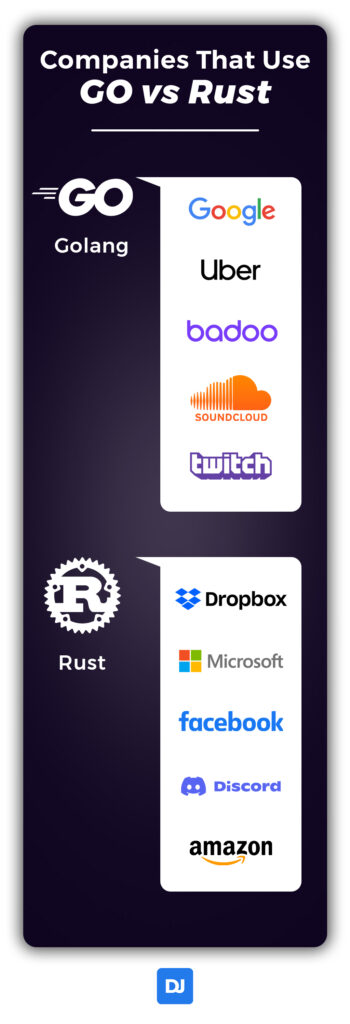Before working on any software project, one of the first decisions you have to make is the language to use. Rust and Go are among the most popular languages in the industry today, with each having its pros and cons.
In this article, we will discuss the similarities and differences between Rust and Golang, including the best use cases for each and the popular apps that use either of the languages.
What is Rust
Rust is a general-purpose and statically typed programming language designed for performance and safety.
The safety bit of this programming language is mainly in concurrency and memory management. It was designed to deal with the safety and performance challenges developers using older programming languages like C and C++ have faced for years. These challenges were mainly memory errors and concurrent programming.
Rust was created in 2006 by Graydon Hoare as a side-project while working at Mozilla. It blends the performance benefits of languages like C and C++ while addressing their major challenges, including complex syntax and poor memory management.
What is Go
Go, also known as Golang, is also a statically typed open-source programming language created by developers at Google that included; Robert Griesemer, Rob Pike, and Ken Thompson. They designed this language in 2009 after facing limitations and memory management issues with C++.
The Go programming language has simplified syntax that makes coding much easier than older languages like Java and C++. Go’s power, thanks to its concurrency capabilities, makes it ideal for cloud services, on-demand services, and social media platforms that get loads of requests within a short period.
Now that we have an idea about each of the two programming languages let’s discuss their similarities and differences.
Similarities between Go and Rust
Go and Rust both compile to fast native executables that you can ship as single, self-contained binaries. They each enforce memory safety—Go with its garbage collector and Rust through its ownership/borrow checker—while offering first-class concurrency (goroutines vs. async tasks) and built-in tooling for code formatting (gofmt vs. rustfmt) and dependency management (modules vs. Cargo) to keep development streamlined. Here’s where they meet in similarity:
1. General-purpose programming languages
Rust and Go are both general-purpose languages that can be used to build different kinds of software, including web applications, network services, and many more. Both languages have huge community support, which has led to the availability of many third-party libraries and support for both languages.
2. Performance and speed
Both Rust and Go compile straight to machine code and ship as single binaries, so they need fewer external libraries and run much faster than interpreted languages like Ruby, Perl, or Python. In real-world benchmarks their speeds are nearly identical—Rust may edge out Go by a hair, but you’d hardly notice—so either choice delivers top-tier performance.
3. Concurrency
Concurrency is a big win for both languages, but Go has the edge today. Its built-in goroutines let you run many lightweight functions at once without the heavy resource cost of traditional threads. That means you can handle lots of tasks in parallel with minimal overhead. Rust is improving its own async and threading story, but right now Go’s native concurrency model is faster and easier to use.
4. Scalability
Both Go and Rust scale impressively because they handle lots of work with minimal CPU overhead. Rust’s zero-cost abstractions and fine-grained control give it an edge for performance-critical tasks—think game engines, browser components, and real-time data pipelines. Go, by contrast, shines in large, distributed systems where quick builds, straightforward code, and built-in concurrency let you grow and maintain massive codebases that process huge volumes of data in real time.
5. Memory safety
Rust and Go are modern programming languages that prioritize memory safety. One of the major drawbacks of older languages like C and C++ is unsafely and incorrectly accessing memory, leading to many vulnerabilities and bugs. This issue is well addressed in both Rust and Go since safe memory management is one of the fundamental ideas behind these languages.
Besides the fact that Go and Rust deal with this problem differently, they all aim at being smarter and safer at memory management than older programming languages. This has made it much easier for developers to build correct and performant programs using either of the languages.
6. Pragmatic programming style
Both Rust and Go let you mix object-oriented and functional styles so you can pick whatever fits the job. Rust just happens to pack in more functional goodies—think pattern matching and algebraic types—so if you really need a functional approach, you’ll have an easier time with Rust (and a Rust developer) than with Go.
7. Multi-Paradigm Flexibility
Another key similarity is that both Go and Rust produce small, self-contained binaries and integrate seamlessly with today’s cloud-native and DevOps workflows. Whether you’re dockerizing microservices or deploying to Kubernetes, their single-file executables—with minimal external dependencies—make building, testing, and shipping reliable, scalable services straightforward and efficient.
Differences between Rust and Go
While both compile to native binaries and emphasize safety and concurrency, they differ in key ways: Go uses a garbage collector for memory safety (with very short pauses) and favors simplicity and fast compile times. At the same time, Rust’s ownership/borrow checker eliminates GC pauses for more predictable, high-speed execution. Apart from that, they also differ in:
1. Security
Rust and Go both prioritize security, but they tackle it in different ways. Go relies on automatic memory management—its garbage collector and built-in allocator—to eliminate whole classes of vulnerabilities like buffer overflows or use-after-free errors without burdening the developer. This not only boosts safety but also keeps performance high. Rust, in contrast, enforces strict borrow-checking and ownership rules at compile time. While this steeper learning curve adds complexity, it catches subtle bugs and memory-safety issues before you even run your code. Together, these approaches make both languages excellent choices for building secure, high-performance cloud applications.
2. Installation
The installation procedures for Rust and Go are easy, though a little different. With Go, all you have to do is download their executable file and run it on any desktop OS, including macOS, Windows, and Linux. With Rust, you will need to download its installation manager tool called Rustup.
After downloading Rustup, you need to run the following command in your terminal for those using macOS; curl –proto ‘=https’ –tlsv1.2 -sSf https://sh.rustup.rs | sh
You should then follow the on-screen instructions thereafter. For developers using other operating systems, you can install Rust using these procedures.
3. Package Management & Tooling
Go modules (go.mod) use a minimal-version selection strategy and are integrated into the go command, but some find the user experience less polished than Cargo. Rust’s Cargo combines build, test, and dependency management with a maximal-version strategy, generally praised for its consistency and ease of use
4. Programming style and syntax
Go and Rust both set out to tame C/C++’s complexity by offering flexible, fast, and secure alternatives. Rust gives you more power per line of code—its richer syntax and strict compile-time checks catch bugs early and squeeze out peak performance, but at the cost of a steeper learning curve. Go keeps things minimal: its simple syntax, built-in tooling, and clear conventions make it easy to pick up, read, and maintain, which is why teams love it for collaboration and rapid delivery. In practice, reach for Rust when you need maximum control and efficiency, and choose Go when simplicity, speed of development, and ease of hiring matter most—many organizations even mix both to suit different parts of their stack
5. Features
Rust has more features than Go, making it more functional in specific scenarios. The main features in Go include binaries and package management. On the other hand, Rust has a long list of features that include; zero-cost abstraction, error messages, move semantics, data race prevention, pattern matching, and many more.
As we earlier shared, the goal of Go was to make the language as easy to use as possible. So, the only features added are those that enhance ease of use and performance. On the other hand, Rust is built to be as functional as possible, which calls for adding more features to broaden the language’s capabilities.
When it comes to features, Rust is the obvious winner.
6. Ecosystem & Community
Go boasts a mature ecosystem around cloud services, container orchestration (Docker, Kubernetes), and microservices, backed by Google and major cloud providers. Rust’s community-driven crates ecosystem is rapidly growing—especially for systems programming, WebAssembly, and blockchain—but remains younger, with more active evolution in the language itself.
7. Resource control
One of the major strengths that Rust has over Go is the freedom they give the developers control over how the machine’s memory is managed, how the available CPU resources of the machine are utilized, how code is optimized, and how problem solutions are crafted. This level of control comes at the cost of complexity, which is a fair trade-off for some developers.
On the other hand, Go prioritizes faster exploration times and quicker turnaround times, making it incredibly easy to write, test, and run code using this programming language.
8. Popularity
Rust was created at Mozilla in 2006, whereas Go was developed at Google in 2009. Go’s simplicity and relatively shallow learning curve have been the primary reasons for its increased popularity. According to StackOverflow, Go is among the top 5 languages loved by developers in 2021.
There are also over 1.1 million developers using Go compared to Rust’s 65,000. So, Go is still way ahead of Rust when it comes to popularity. Another reason for Go’s increased popularity is that it’s backed by Google, one of the biggest tech companies in the world. Developers find it much safer to learn a language they hope to use many more years to come. Go is one of those languages that everyone thinks will stick around for many years.
Looking at the above differences, it is very clear that each language has advantages over the other. And most of the time, you will notice that some of these advantages come at a cost that a developer needs to consider before making the choice of whether to use the language or not. For example, Rust prioritizes getting more done with less code, but this comes at the cost of complexity and a relatively steep learning curve.
On the other side of things, Go’s priority is always on the simplicity side, which comes at the cost of limited functionality. However, this simplicity makes the languages incredibly easy to learn and ideal for developers working in teams to collaborate on projects.
Rust vs Go – use cases
Each of these languages is best for different purposes. Although we love to compare these languages, each of them surely excels if used in scenarios it was built for.
When to use Rust
From the ground up, Rust’s apps are designed to have full control over the hardware, making it ideal if you want to get the best possible performance from the available hardware resources. So, Rust is suitable for building apps that process huge quantities of data and other CPU-intensive operations.
It is also an excellent choice for ensuring safety in complex systems because of its bug detection capabilities. However, as we shared earlier, these come at the expense of more complexity during the coding process. Its strict compiler makes it possible to detect bugs and vulnerabilities ahead of time before the application is deployed.
Usually, programmers who prefer better to faster coding will always choose Rust over Go.
Some of the best scenarios and use cases for Rust include the following;
- Apps that involve algorithm execution
- When improved memory safety is important
- When you have room for writing complex code
- More development time is available
- Rust is also suitable for building cloud apps, security-sensitive apps, or systems components that are at the core of the software project
- When the execution speed is more important than the rest of the considerations.
When to use Go
Go will always do a better job in developing server-side applications, thanks to its goroutines that are built to handle huge amounts of concurrent, independent requests. That is why apps like Uber, YouTube, and Twitch use Go as one of the primary languages on their server-side systems.
Go is also ideal for those who prioritize simplicity over everything else. It is probably one of the simplest programming languages, with straightforward syntax. This single attribute makes it the best choice for agile teams collaborating on projects. The programming language is also ideal for writing lightweight services, such as generating back-end APIs that interact with front-end applications.
It is also the ideal language for building web applications that are to be deployed on Google’s cloud infrastructure because it is fully supported. Go does very well where high-performance cloud applications are involved.
Some of the scenarios where you should choose Go include the following;
- When large team collaboration is crucial because of its simplified syntax
- If you need to create apps that deal with large amounts of concurring data
- When simplicity is your priority over features
- Fast interaction is a priority
- When speed and flexibility in coding matter to you than having lots of features and functionalities.
- When building APIs, Web Apps, Data Processing, and Cloud apps
Companies that use GO vs Rust

Although this may not be something to rely on while making your choice, knowing the big brands that use these languages and what they use them for should give you an idea of how the language is perceived and its potential.
The following are the companies that use Go
Go was built by Google engineers, so it is a no-brainer that most Google applications are built primarily with this language. Some of the internal apps and services at Google built with Go include; Google Chrome, Google Earth, YouTube, and many more. Of course, several other languages are used while building these apps, but Go is among the primary ones.
Uber
Uber uses Go for building the geofencing functionality in their app. Although Node.js was the first language they used, Uber shifted to Go because they wanted a language that could offer the performance required to handle the thousands of geofence lookups requests they receive every second.
Badoo
Badoo is one of the most popular dating apps with over 400 million users. Like Uber, Badoo also handles hundreds of thousands of requests almost every minute, which calls for a highly efficient language. From Badoo’s point of view, Go was the best alternative. Go is also ideal for search-based applications, and Badoo being a dating app, one of the common tasks that its users do with the app is searching.
Soundcloud
Soundcloud is a music live streaming service with over 175 million monthly listeners. Dealing with requests from all these listeners requires a well-optimized language, and Go is the language Soundcloud chose to use. One of the reasons why Soundcloud chose Go over several other available options is Static analysis – a method for debugging code that is built right within Go.
Twitch
Twitch has over 45 million users in the US alone. Being a live streaming service for games, handling multiple requests in real-time is a priority for the platform. Go has enabled Twitch to improve its garbage collection through refined memory management that has greatly improved the user experience of gamers using this platform.
The following are the companies that use Rust
Dropbox
Dropbox is one of the most popular cloud storage platforms. It uses Rust for its file synchronization engine. Rust’s static types and heavy compile-time checks are why Dropbox chose Rust over other languages like python. This language also makes it easier to write, test and debug code for Dropbox’s highly concurrent synchronization engine.
Microsoft
Microsoft is one of the most popular companies that use Rust in some of their applications. The company has previously been experimenting with the possibility of integrating Rust into their large codebases of C and C++. The main reason why Microsoft chose Rust is attributed to Rust’s memory safety capabilities.
For over 12 years, over 70% of common vulnerabilities and Exposures discovered in Microsoft apps had a connection to memory safety. So, integrating Rust in their system might probably lower this statistic.
Facebook also used Rust to rewrite its source control backend that was initially written in python. They chose Rust over python and several other languages because of the safety benefits of Rust. Rust also helps them to detect large classes of serious bugs at compile-time, which saves cost than having the bugs detected in production.
Discord
Discord uses Rust both on the client-side and server-side of their codebase. One of the places they used Rust was in Elixir. They used Rust to scale up to 11 concurrent users using Elixir’s Native Implementation Functions. The company chose Rust because of its performance benefits and memory Safety.
Discord had also originally written their Read States Service in Go, but it sometimes had large latency spikes resulting from Go’s garbage collector. Discord switched from Go to Rust because Rust offers a unique memory allocation that is way more efficient than garbage collection.
Amazon
Amazon also uses Rust in some of its AWS components that are performance-sensitive. Some of the services they use this language include; Lambda, EC2, and S3. Amazon is also known to openly support and sponsor the development of the language and its entire ecosystem. The company also has open-sourced Firecracker VMM – a service written using the Rust programming language. This virtual machine monitor was built for AWS services, including AWS Fargate and AWS lambda.
Rust vs. Go: Who Wins?
Both Rust and Go are excellent programming languages, and your choice should entirely depend on the project you intend to use them for.
Go is ideal for cloud services and web applications that get many requests per second. On the other hand, Rust is ideal for apps where performance efficiency, memory safety, and detecting bugs and vulnerabilities are the major priorities.
You must also keep in mind that Go is a much simpler language, and this comes at the expense of fewer features and functionality. On the other hand, Rust aims at getting more done with less and has way more features and functionalities than Go. So, before hiring a Go or a Rust developer for your project, first, do a proper assessment of priorities and requirements for the project you intend to use any of these languages for.





